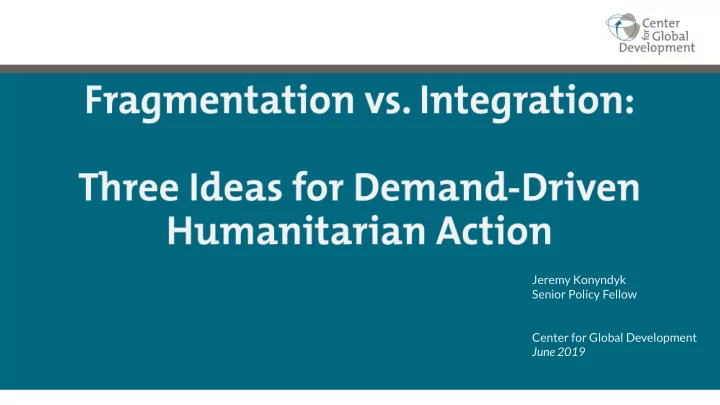

Jeremy Konyndyk Senior Policy Fellow Center for Global Development June 2019
“Global challenges are more and more integrated, and the responses are more and more fragmented, and if this is not reversed, it's a recipe for disaster.” A rather good description of the humanitarian landscape as well! Jeremy Konyndyk | CGDev.org
New trends are challenging our traditional organizing principles: • Multi-purpose Cash • Multi-sector programming • Triple Nexus • Joint needs analysis • Feedback and accountability Integration must be our future – but it is held back by our past. Jeremy Konyndyk | CGDev.org
….have concurrent reforms had an impact on funding priorities? Jeremy Konyndyk | CGDev.org
Proportional funding allocation has been static for decades…. Jeremy Konyndyk | CGDev.org
Core institutional incentives and power dynamics impede coherence: Vertically siloed, one-stop-shop multilateral agencies • Funding allocated by agency mandate/sector – each agency acts as • its own pooled fund Response plans are built around agency mandate/sector • Coordination and planning built around individual sectors • Donor practices both reflect and perpetuate this fragmentation – it frames who and what they choose to fund. Jeremy Konyndyk | CGDev.org
Here are three ideas… Jeremy Konyndyk | CGDev.org
You can’t have a participation “revolution” without overthrowing power structures! Demand-driven aid starts with listening to demand signals: Influence : Representation of affected people’s voices in • decision-making on governance, response strategy, and field implementation Independence : “Participation and feedback audits ” of aid • groups; feedback mechanisms outside of agency control Institutionalize: Enabling changes to donor practice, staff • competencies, project sequencing, analytics Jeremy Konyndyk | CGDev.org
• Funds strategic responses strategically • Pool funding based on geography/plan rather than agency • Activity-based costing and prioritized tranches • Eliminate donor “lumpiness” with up-front annual donor commitments • Amortized multi-year costing to unlock new priorities • If cash can be financed and delivered distinct from mandates, why not other programs too? Jeremy Konyndyk | CGDev.org
As clusters have super-sized: Would area-based coordination perform better? • Funding follows clusters (and • Organized around related mandates) geography, not sector • Explicitly multi-sectoral • Inter-cluster coordination a persistent problem • Engages affected people through participatory • Weak field-level coordination design • Key decisions inaccessible to affected people Proof-of-concepts underway in DRC, and NGO programs • Embeds blind spots Jeremy Konyndyk | CGDev.org
Recommend
More recommend